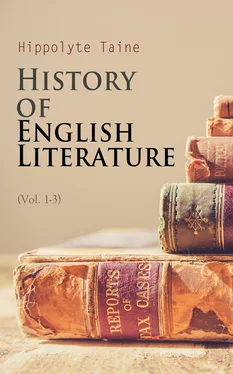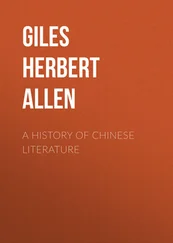Amid passions so strong as these there is not one lacking. Nature appears here in all its violence, but also in all its fulness. If nothing had been weakened, nothing had been mutilated. It is the entire man who is displayed, heart, mind, body, senses, with his noblest and finest aspirations, as with his most bestial and savage appetites, without the preponderance of any dominant circumstance to cast him altogether in one direction, to exalt or degrade him. He has not become rigid, as he will be under Puritanism. He is not uncrowned as in the Restoration. After the hollowness and weariness of the fifteenth century, he rose up by a second birth, as before in Greece man had risen by a first birth; and now, as then, the temptations of the outer world came combined to raise his faculties from their sloth and torpor. A sort of generous warmth spread over them to ripen and make them flourish. Peace, prosperity, comfort began; new industries and increasing activity suddenly multiplied objects of utility and luxury tenfold. America and India, by their discovery, caused the treasures and prodigies heaped up afar over distant seas to shine before their eyes; antiquity rediscovered, sciences mapped out, the Reformation begun, books multiplied by printing, ideas by books, doubled the means of enjoyment, imagination, and thought. People wanted to enjoy, to imagine, and to think; for the desire grows with the attraction, and here all attractions were combined. There were attractions for the senses, in the chambers which they began to warm, in the beds newly furnished with pillows, in the coaches which they began to use for the first time. There were attractions for the senses, in the chambers which they began to warm, in the beds newly furnished with pillows, in the coaches which they began to use for the first time. There were attractions for the imagination in the new palaces, arranged after the Italian manner; in the variegated hangings from Flanders; in the rich garments, gold-embroidered, which, being continually changed, combined the fancies and the splendors of all Europe. There were attractions for the mind, in the noble and beautiful writings which, spread abroad, translated, explained, brought in philosophy, eloquence, and poetry, from restored antiquity, and from the surrounding renaissances. Under this appeal all aptitudes and instincts at once started up; the low and the lofty, ideal and sensual love, gross cupidity and pure generosity. Recall what you yourself experienced, when from being a child you became a man: what wishes for happiness, what breadth of anticipation, what intoxication of heart wafted you towards all joys; with what impulse your hands seized involuntarily and all at once every branch of the tree, and would not let a single fruit escape. At sixteen years, like Chérubin, [406]we wish for a servant girl while we adore a Madonna; we are capable of every species of covetousness, and also of every species of self-denial; we find virtue more lovely, our meals more enjoyable; pleasure has more zest, heroism more worth: there is no allurement which is not keen; the sweetness and novelty of things are too strong; and in the hive of passions which buzzes within us, and stings us like the sting of a bee, we can do nothing but plunge, one after another, in all directions. Such were the men of this time, Raleigh, Essex, Elizabeth, Henry VIII himself, excessive and inconstant, ready for devotion and for crime, violent in good and evil, heroic with strange weaknesses, humble with sudden changes of mood, never vile with premeditation like the roisterers of the Restoration, never rigid on principle like the Puritans of the Revolution, capable of weeping like children, [407]and of dying like men, often base courtiers, more than once true knights, displaying constantly, amidst all these contradictions of bearing, only the fulness of their characters. Thus prepared, they could take in everything, sanguinary ferocity and refined generosity, the brutality of shameless debauchery, and the most divine innocence of love, accept all the characters, prostitutes and virgins, princes and mountebanks, pass quickly from trivial buffoonery to lyrical sublimities, listen alternately to the quibbles of clowns and the songs of lovers. The drama even, in order to imitate and satisfy the fertility of their nature, must talk all tongues, pompous, inflated verse, loaded with imagery, and side by side with this, vulgar prose: more, it must distort its natural style and limits; put songs, poetical devices, into the discourse of courtiers and the speeches of statesmen; bring on the stage the fairy world of the opera, as Middleton says, gnomes, nymphs of the land and sea, with their groves and their meadows; compel the gods to descend upon the stage, and hell itself to furnish its world of marvels. No other theatre is so complicated; for nowhere else do we find men so complete.
SECTION III.—Some Aspects of the English Mind
Table of Contents
In this free and universal expansion, the passions had their special bent withal, which was an English one, inasmuch as they were English. After all, in every age, under every civilization, a people is always itself. Whatever be its dress, goat-skin blouse, gold-laced doublet, black dress-coat, the five or six great instincts which it possessed in its forests, follow it in its palaces and offices. To this day, warlike passions, a gloomy humor, subsist under the regularity and propriety of modern manners. [408]Their native energy and harshness pierce through the perfection of culture and the habits of comfort. Rich young men, on leaving Oxford, go to hunt bears on the Rocky Mountains, the elephant in South Africa, live under canvas, box, jump hedges on horseback, sail their yachts on dangerous coasts, delight in solitude and peril. The ancient Saxon, the old rover of the Scandinavian seas, has not perished. Even at school the children roughly treat one another, withstand one another, fight like men; and their character is so indomitable that they need the birch and blows to reduce them to the discipline of law. Judge what they were in the sixteenth century; the English race passed then for the most warlike of Europe, the most redoubtable in battle, the most impatient of anything like slavery. [409]"English savages" is what Cellini calls them; and the "great shins of beef" with which they fill themselves, keep up the force and ferocity of their instincts. To harden them thoroughly, institutions work in the same groove with nature. The nation is armed, every man is brought up like a soldier, bound to have arms according to his condition, to exercise himself on Sundays or holidays; from the yeoman to the lord, the old military constitution keeps them enrolled and ready for action. [410]In a state which resembles an army it is necessary that punishments, as in an army, shall inspire terror; and to make them worse, the hideous Wars of the Roses, which on every flaw of the succession to the throne are ready to break out again, are ever present in their recollection. Such instincts, such a constitution, such a history, raise before them, with tragic severity, an idea of life: death is at hand, as well as wounds, the block, tortures. The fine cloaks of purple which the renaissances of the South displayed joyfully in the sun, to wear like a holiday garment, are here stained with blood, and edged with black. Throughout, [411]a stern discipline, and the axe ready for every suspicion of treason; great men, bishops, a chancellor, princes, the king's relatives, queens, a protector, all kneeling in the straw, sprinkled the Tower with their blood; one after the other they marched past, stretched out their necks; the Duke of Buckingham, Queen Anne Boleyn, Queen Catherine Howard, the Earl of Surrey, Admiral Seymour, the Duke of Somerset, Lady Jane Grey and her husband, the Duke of Northumberland, Mary Stuart, the Earl of Essex, all on the throne, or on the steps of the throne, in the highest rank of honors, beauty, youth, and genius; of the bright procession nothing is left but senseless trunks, marred by the tender mercies of the executioner. Shall I count the funeral pyres, the hangings, living men cut down from the gibbet, disembowelled, quartered, [412]their limbs cast into the fire, their heads exposed on the walls? There is a page in Holinshed which reads like a death register:
Читать дальше












